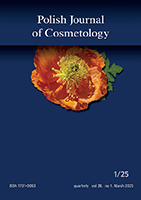search by
Copyright @ Pol J CosmetolEvaluation of effectiveness of supplementation of nutricosmetic in the form of tablets - pilot studiesWioletta Tomaszewicz 1/, Ariel Liebert 2/, Anna Długosz 3/, Joanna Gracz 3/, Jacek J. Klawe 1/ 1/ Katedra Higieny, Epidemiologii, Ergonomii i Kształcenia Podyplomowego, Wydział Nauk o Zdrowiu, Collegium Medicum w Bydgoszczy, Uniwersytet Mikołaja Kopernika w Toruniu 2/ Katedra Gastroenterologii i Zaburzeń Odżywiania, Wydział Nauk o Zdrowiu, Collegium Medicum w Bydgoszczy, Uniwersytet Mikołaja Kopernika w Toruniu 3/ Katedra Inżynierii i Analityki Chemicznej i Spożywczej, Wydział Technologii i Inżynierii Chemicznej, Politechnika Bydgoska im. Jana i Jędrzeja Śniadeckich Summary Introduction. The nutritional status significantly affects the condition of the hair. Deficiencies of vitamins, minerals and essential fatty acids can result in excessive hair loss and oily hair, loss of color and brittleness. Due to the limited bioavailability of nutrients from food products, the popularity of enriching the daily diet with the use of dietary supplements is constantly growing. Nutrikosmetics deliver a concentrated dose of ingredients with bioactive properties to the body in an easily digestible form and a dose exceeding that which can be provided with food. Aim. Assessment of the effectiveness of a 3-month supplementation with nutricosmetics in the form of uncoated tablets. Material and methods. The study involved 20 women, with an average age of 46.9±13.5 years, who were subjected to oral supplementation with nutricosmetics in the form of uncoated tablets for a period of 3 months. Immediately before and after the end of the treatment, an elemental analysis of the hair composition was performed using the atomic absorption spectrometry method. The content of the following elements was determined: zinc (Zn), copper (Cu), selenium (Sn) and manganese (Mn). Results. Women aged 41-50 (31.6%) dominated in the sample. About 79% of the respondents have higher education, and 73.5% did not have chronic diseases. In the opinion of the study participants, the intensity of hair loss before supplementation was "average" (31.6%). More than 40% of the surveyed women considered the general condition of their hair "good" before the test. From the effects obtained as a result of the treatment, 68.4% of the respondents were "satisfied". As a result of supplementation with tablets, a statistically significant increase in the levels of all analyzed elements was observed, ranging from 29.59% (zinc) to 49,16% (copper). Conclusion. Studies have shown that a 3-month supplementation with the tested nutricosmetic is effective and may have a positive effect on the condition of the hair. Key words: hair condition, dietary supplements, nutricosmetics, microelements, macroelements, elemental analysis |




